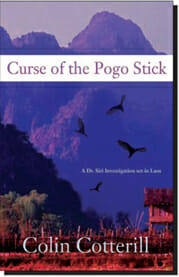Introducing Endless Mode: A New Games & Anime Site from Paste
A new mystery genre rears its lovely head
If I have to read one more blood-drenched mind-of-a-serial-killer novel, I’ll scream. Or maybe whimper.
For many years I’ve devoured a steady stream of gritty noir mystery fiction, a profusion of Poe’s and Hammett’s hard-hearted, steely-eyed descendents. But I’ve found lately that noir’s appeal wanes in the face of so much real-life violence and mayhem. Another thing entirely has crept stealthily into my to-be-read pile.
Typically set in exotic locales—Laos, Botswana, New Jersey—and characterized by a decidedly warmer, more humanist bent, this newly emerging anti-noir genre of mysteries refuses to focus on the darkness of the human heart or the worst traits of the worst among us. Instead it centers on regular folks all over the world, septuagenarian communist coroners and traditionally built African lady detectives and dyspeptic ne’er-do-wrong burglars, who happily mean well and love others, and whose mystical experiences provide them with some light at the end of the evolutionary tunnel. In musical terms, this raft of new, more lighthearted novels sounds like sunny, hook-centric pop instead of your standard death-metal hard-boiled mysteries. Think Fountains of Wayne as opposed to Slayer.
These books—mostly from international authors—stake out new territory in the ever-expanding mystery realm. I’ll call this recently minted genre blanc fiction, the polar opposite of noir. Neither drawing-room cozies nor soft-boiled emo detective stories, these mysteries actually portray human beings as essentially good. Their authors—led by quirky Colin Cotterill, gentle Alexander McCall Smith and brilliant veteran Donald Westlake—cast their main characters from similar molds: quietly intelligent, funny and wise regular folks with a mystery to solve or a murder to puzzle out. The death in these books isn’t gory or protracted or the result of evil or inherent inner rottenness; it’s incidental and understandable after a bit of ratiocination or the odd transcendental, magical-realist experience.
Reflecting the growing globalization of literary fiction, blanc’s nontraditional settings—often far removed from Western civilization—offer a new cultural canvas that emphasizes an open, accepting universality and fresh insight into what makes humanity tick. These books give us the pursuit of justice without the cool ironic detachment, alienation and despair of noir, and though they aren’t fantasy, wondrous things often occur. Solving the crime? Not really the point. It’s the smiling psychological and even spiritual understanding of the crime that makes blanc fiction compelling.
The Curse of the Pogo Stick—ex-pat British writer Colin Cotterill’s newest book (in a wonderful, offbeat series of five so far)—nails the blanc fiction movement. In his newest, Cotterill’s aging protagonist, Laotian coroner Dr. Siri Paiboun, goes on a roadtrip through the countryside and is captured by friendly tribeswomen who believe he can help them lift the effects of a lingering curse on their people. The curse involves the titular pogo stick, a symbolic stand-in for the deleterious effects of Western culture, and a modest metaphor for the American abandonment of the region’s hill-people allies after the U.S. military withdrawal from Vietnam in 1975. When Siri attempts to help, he encounters the resulting genocidal treatment of the Hmong tribe after the Communist takeover of Laos in the ’70s—and treats it with a rare, detached gentleness.
This works. We have all been repeatedly assaulted by the manifold accounts of the horrors of modern warfare and its aftermath, and we’ve seen the realities of Cambodia, Rwanda and Darfur. In the process, we’ve become hardened and ever more un-shock-and-awe-able. Cotterill’s approach in Curse of the Pogo Stick—so measured and offhand—actually achieves a remarkable feat: It cuts through all the never-again media saturation that genocidal regimes often generate, and it makes us take notice once more. We wind up caring about Cotterill’s characters, because they’re mostly either decent or at least understandably flawed and therefore human. By avoiding the nastiness and nihilism of noir, they reach a sympathetic, soulful reality writers rarely pull off.
This new crop of blanc fiction novels, swinging the pendulum away from the prevailing noir nightmares and serial-killer grindhouse bloodfests, seems to presage a kinder or at least more sensate world. Here, likable, selfless and corrigible characters go through life with good intentions and reserved bemusement at the human condition; plots revolve around small day-to-day victories; the moments of gentle, eye-widening awareness that make us happy to be here.
Blanc fiction offers hope. Take a break from all the doom and darkness, and read some.
